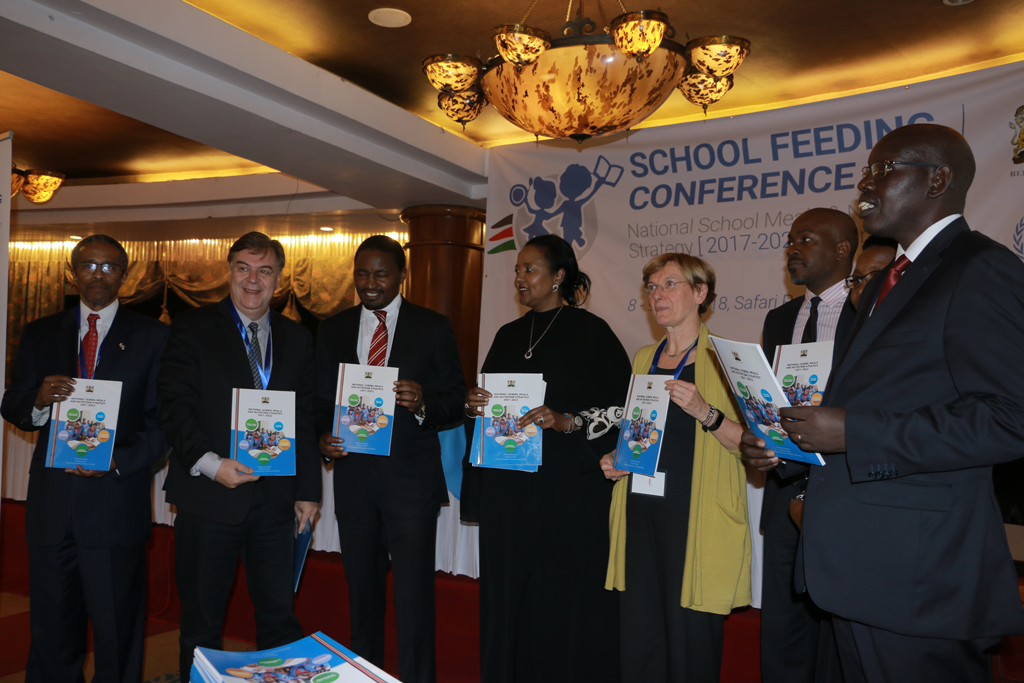During an event on 8 and 9 May, the government of Kenya launched the country’s School Meals and Nutrition Strategy, which will guide the implementation of multi-sectoral programmes in schools and communities. The document presents five strategic objectives, including the promotion of the sustainability of the school feeding programme to advance local and inclusive development.
The document of the strategy was elaborated by a multi-sectoral team that included the WFP Centre of Excellence against Hunger. The technical support of the WFP Centre of Excellence to Kenya began in 2016, when a governmental delegation undertook a study visit to Brazil to exchange knowledge on school feeding and nutrition approaches.
The strategy launching event was part of a two-day seminar with the participation of county directors of Education and members of county Executive Committees of Education, as well as officials from the Ministries of Education, Agriculture and Health. The first day of event was dedicated to a National School Meals Conference. The conference was an opportunity for school meals practitioners across the country to reflect on the programme and make recommendations for improvement. The second day was used to present and officially launch the National School Meals and Nutrition Strategy.

“The strategy represents an important milestone, unlocking a wide range of benefits from school meals, not only to the children, but also for their households and communities,” said the minister of Education of Kenya, Dr. Amina Mohamed. She also highlighted the multi-sectoral approach of the strategy: “The strategy is a comprehensive document, containing not only targets and goals, but also defining roles and responsibilities for different actors from the sectors involved.” The minister of Agriculture, Moanji Kiujuri, reiterated the support of his Ministry to school feeding and stressed the importance of strengthening smallholder farmers to ensure food and nutritional security.
Daniel Balaban, director of the WFP Centre of Excellence, said, “I would like to invite the authorities here to strengthen your advocacy for the decision to recognize school feeding as a vehicle for social development to become a reality for students in all African countries”. He also committed the WFP Centre of Excellence to continue providing technical support to countries: “Whenever there is a country asking for support on school feeding, we will be there for you. This is our mission.”
Representatives of UNICEF, USDA and other development partners also attended the event, as well as Annalisa Conte, director of the World Food Programme office in Kenya.
The strategy
The School Meals and Nutrition Strategy (2017-2022) provides a common ground for the design and implementation of nutrition-sensitive school meals in Kenya. It is based on the commitment of the Government of Kenya to ensure that school children are well nourished, healthy and are able to learn and develop their full potential. The national government is committed to strengthen the national School Meals and Nutrition Programme and coordinate similar efforts to ensure that all children in pre-primary and primary schools receive at least one nutritious meal per school day. It emphasizes the need for National and County Governments to closely coordinate their school meals initiatives.
The five strategic objectives are:
1. To increase awareness and intake of adequate, locally available, and nutritious food among school children and their communities
2. To improve the enrolment, attendance, retention, completion, and learning of school children with equity
3. To promote local and inclusive development
4. To develop and implement a sustainable national school meals and nutrition programme
5. To promote partnerships and multi-sectoral coordination for complementary support and effective implementation of the school meals and nutrition programme
Kenya’s school meals programme was initiated by the government of Kenya and the World Food Programme in 1980 in response to a severe drought the previous year. Starting with 240,000 students in arid and semi-arid areas, the programme aimed to encourage parents to enroll and keep their children in school and targeted both pre-primary and primary school children. Both WFP and the Ministry of Education are currently supporting more than 1.5 million children with school meals.




